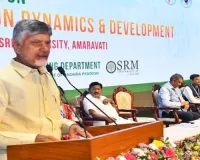AP Public Accounts Committee challenges Jagan Govt’s power deals in 2022
By The Capital
On

• CPI questions tendering process
Patibandla Srinivas ([email protected])
Andhra Pradesh Finance Minister Payyavula Keshav, who was the Chairman of the Public Accounts Committee (PAC), had raised objections to the solar Power Sale Agreement (PSA) between the State government and Adani Azure Group in 2022. According to the sources, Keshav submitted a written complaint to the Central Regulatory Commission (CERC) also about the tender modification and agreement.
However, the CERC did not consider the complaints and approved the changes made by Solar Energy Corporation of India. Interesting facts in the developments, Keshav filed a petition at legal forums challenging the agreements.
CPI State Secretary K Ramakrishna had also challenged the agreement with a petition in 2021. Both the petitions are still pending with the legal forums. Later Keshav brought his objections to the notice of the Central Electricity Regulatory Commission (CERC) in 2022 when the issue of downward revision of tariff came up.
While he was not a party to the matter, due to his repeated communications to CERC on the matter, Keshav was allowed to make a 16-point written submission to CERC in an affidavit dated 24.02.2022 objecting to the tender modifications and the decisions on tariff revision as per the CERC records by a news report.
The Centre’s Regulatory Commission finally moved in SECI's favour on April 4, 2022. Later PAC Chairman Keshav filed a writ petition in the AP High Court challenging the Commission's order. The wisdom of the previous YSR Congress Jagan Mohan Reddy’s government was questioned by the Public Accounts Committee in the petition about the costliest contract with the Adani’s group.
Presently Keshav did not make any comment in this regard due to the issue being pending with the legal forums. A review of Keshav's objections submitted to CERC includes question on how the tendering process allowed the ceiling tariff to be pitched at ₹2.93/kWh which was 'exorbitantly higher than present-day tariff' and was later 'suo-moto revised/reduced' by successful bidders to ₹2.54/kWh when the prevailing rate was only around ₹ 2/kWh, the news report told.
The PAC questioned the policy of merging solar manufacturing plants in a single tender which ultimately 'stopped' the number of bidders and affected 'the competitiveness of the bid resulting in the 'inordinate hike in tariff'. The revisions in tender conditions to allow the 'Green shoe' option-under which successful bidders are allotted additional capacities equivalent to what they already bid for and won- was also questioned by Keshav.
As per the reports, in its own submissions to CERC, SECI held that voluntary reduction of tariff by selected bidders in a competitive bid process is not contrary to the principle of transparent bidding and any such downward revision 'benefits the consumers in terms of lower tariff'. It also put forth that there was no legal condition preventing linking of ancillary activities like manufacturing plants with solar power plants and cited the Centre's commitment to the 2020 'Atmanirbhar Bharat' Abhiyan to fortify solar PV generation and manufacturing in the country.
The CERC finally ruled on April 2, 2022, that the selection of the successful bidders has been done and the tariff of solar power projects has been discovered by SECI 'through a transparent process' and in accordance with the guidelines issued by the ministries of Power and New and Renewable Energy.
Tags
Latest Posts
08 Apr 2025
Declining for the third straight session, the rupee tumbled 50 paise to settle at 86.26 (provisional) against the US dollar...






